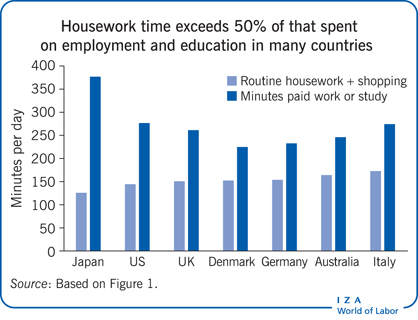Elevator pitch
The time household members in industrialized countries spend on housework and shopping is substantial, amounting on average to about half as much time as is spent on paid employment. Women bear the brunt of this burden, a difference that is driven in part by the gender differential in wages. Efforts to reduce the gender wage gap and alter gendered norms of behavior should reduce the gender bias in household production time and reduce inefficiency in home production. Policymakers should also note the impact of tax policy on housework time and consider ways to reduce the distortions caused by sales and income taxes.

Key findings
Pros
Contributions in the household sector are often undervalued, leading to underestimates of economic well-being.
Gender differences in housework time caused by gendered social norms or discrimination are not efficient.
Income and sales taxes distort incentives and lead individuals, especially women, to allocate more time than is socially optimal to household production.
Women who spend more time on housework have been found to earn lower wages, suggesting a vicious cycle, with wage differentials driving allocations to housework time and housework time driving wage differentials.
Cons
Household production yields valuable services and constitutes an important sector of the economy.
Gender differences in housework time that are caused by gender differences in opportunity costs or productivity are efficient.
Some observed differences in housework time could be attributable to preferences; the limited evidence available on preferences suggests that, on average, women prefer housework more than men do.
Gender differences in housework time have been declining and may be contributing to reduced gender differentials in earnings.